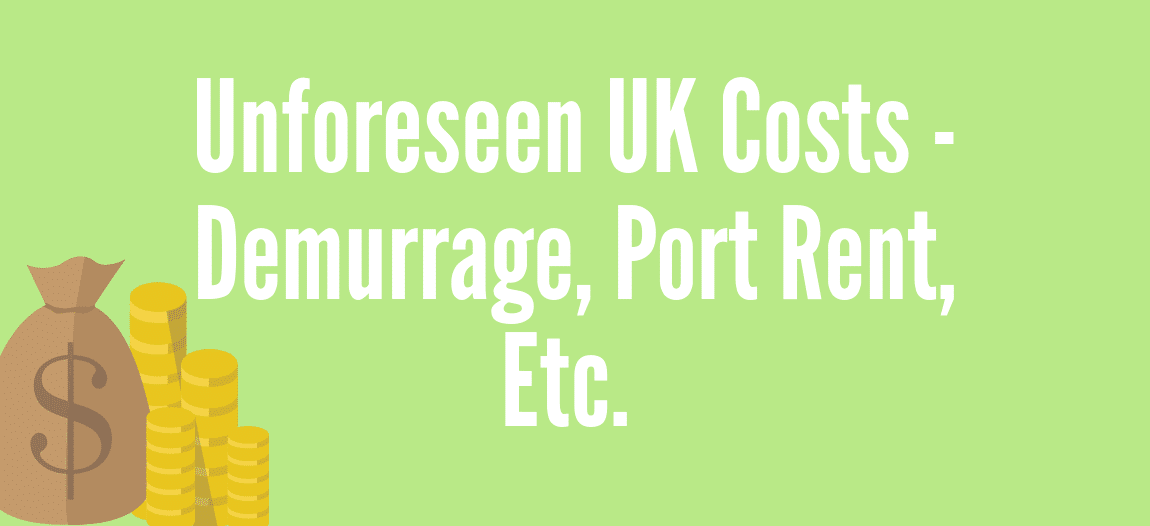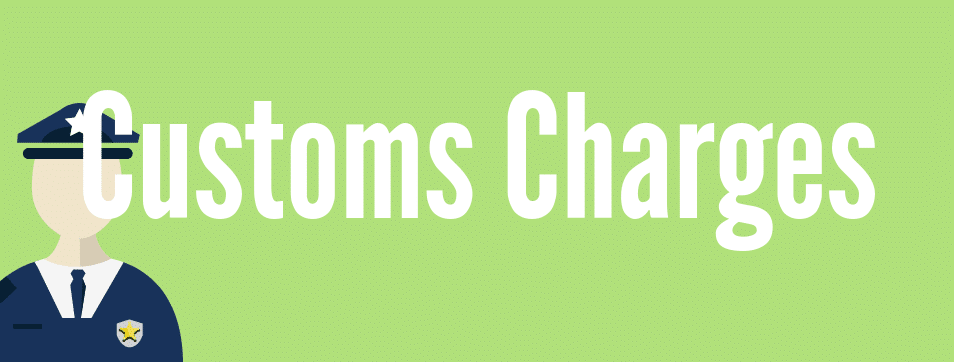When you’re importing goods you can run into some unforeseen UK importing costs that are seemingly unfair, unjust, and on occasion completely and utterly extortionate.
Unforeseeable UK Importing Charges – What & Why
Here at Shippo, we pride ourselves on being completely transparent about our costs and how much you’ll have to pay – we give you one quote from the outset and we stick to it.
That said, there is an outside chance that additional costs could arise when your goods arrive in the UK . . . so today we’re talking about the costs that you can accrue once your shipment has landed, explaining what each of these costs is and helping you understand how to avoid them.
There are a variety of charges you’ll definitely face when your goods are declared to customs; UK Duty and Import VAT are a given in the vast majority of cases, but there is a slim chance that delays can leave importers saddled with huge unforeseen UK importing costs. These costs can leave a sour taste in the mouth at the very least and, on rare occasions, eliminate the importer’s profits to huge extents.
You will normally pay your shipping company for these extra charges but they are probably not responsible for them. The costs are usually just being forwarded on from another party. Generally, these costs go to the shipping line, the port, HMRC, a warehouse storing your goods or a haulier.
Companies like Shippo may pay on your behalf, but we don’t keep the money or make a profit on these rare but annoying extra charges!
You can minimise the chances of these extra costs by ensuring everything is in place – we’ve already written an easy guide to clear UK Customs that you can read – but today’s post is about what these delay-induced charges are and where and why they happen as you can’t totally eradicate the chance that they may rear their ugly heads.
What Are These Unforeseen Import Fees?
There are four main import fees that we’re covering today:
- Demurrage (from the shipping line)
- Port Rent (from the port)
- Warehouse Rent (from the warehouse that unpack the container)
- Customs Fees (from HMRC)
- Vehicle Detention (from the haulier).
-
Demurrage Explained
Demurrage is the charge from the shipping line to the consignee when (during FCL shipments) a container is held for longer than the free time that the shipping line allows. The free time period is usually 5-7 days after the vessel lands and varies from shipping line to shipping line.
If for some reason you can’t move your container within the free time frame you’re allowed (normally because customs haven’t cleared and released the shipment), you will be charged a daily fee until you can move it.
Essentially, demurrage fees are costs that arise because the shipping lines either want to get their container back for its next voyage as soon as possible or make sure it’s making them money in some other way. It is usually around £40-60 per day after free time.
NOTE
Demurrage charges are only applicable to FCL shipments.Save
-
Port Rent Explained
Very much like demurrage, the ports only have a certain amount of space on their quay – and they only give a few free days after the vessel lands for a container to be taking up that space. To keep things running smoothly, the port needs items to have a quick turnover rate. If the ports didn’t turnover cargo quickly, there would be massive build-ups of goods and delays, so the fees charged at customs act as an incentive to move your goods quickly.
Once it’s been there for a certain amount of time, the port starts charging rent.
NOTE
Port Rent charges are only applicable to FCL shipments.Save
-
ERTS/ETSF Warehouse Rent Explained
ERTS rent (now called ETSF) is a killer!
If a shipment is in a shared container (LCL shipment), it has to be unpacked by a warehouse. There are two sections to these warehouses; most of the warehouse is for storage of goods that are customs cleared and ready to be collected/dispatched. So what happens to the goods that have been unpacked from a container but not cleared and released into the country by HMRC?
Goods that haven’t been cleared by customs are put into a small section of the warehouse called an External Temporary Storage Facility (ETSF, formerly known as an Enhanced Remote Transit Shed or ERTS). This section of the warehouse is overseen by HMRC who allow goods to be temporarily stored under bonded conditions pending clearance and release.
This bonded section of the warehouse is expensive to run and minuscule in comparison to the rest of the warehouse. As a result, if goods are not cleared and released within the free time (as with the other extra unforeseen costs) the storage fees can be, quite frankly, ridiculous. There are usually 5-7 days of free time for all the customs formalities to be finalised and the goods will normally be removed before any charges are incurred. 99% of the time this is absolutely fine. But what if there is a delay?
These warehouses can pretty much charge what they like and £20 per cubic metre per day is not an uncommon cost for an ERTS warehouse to charge past the free time. If your shipment is large, this could destroy any potential profits within a handful of days.
This should be a consideration when selecting whether you ship your goods as a full container or as a less-than-container load shipment. For example:
20cbm could be shipped as LCL or FCL. If held for a week after the free period, a full container load would have extra costs of around £400 and a shared container load of around £3000!
NOTE
Warehouse Rent is only applicable to LCL shipments.Save
-
Customs Charges
If your goods are flagged by customs to be investigated, you will be charged for any procedures that are required, such as X-Rays and lab tests. The good news, however, is that these costs are much lower than port rent or demurrage, usually around £50-100. However, if customs delay your goods to have these tests carried out, then the chances are you’ll not be able to get your hands on the container before some demurrage fees are applicable.
NOTE
Customs charges can be applied on any type of shipment.Save
-
Vehicle Detention
When shipping goods in a full container, your delivery will essentially consist of your container being loaded onto the back of a truck and driven to you. Once it arrives, you’ll have 3 hours to unload it before the truck drives off with the empty container.
If you hold the driver up for more than the 3 hours allowed, the haulier will charge you for around £50 per hour over the time allowed. This covers the haulier for the drivers time, delays to their next job and pushes customers to let the driver go quickly so he can get home to his family in time for tea!
NOTE
Vehicle detention is more of a concern for FCL deliveries.Save
-
Common Hold Ups That Cause Unforseen Fees In The UK
There are times where circumstances are completely out of your control and your goods are held-up (and therefore subject to these extra costs). This is horrible; it’s not your fault and you’re landed with these extra costs that you can’t get out of. Fortunately, a lot of the time these additional fees are absolutely avoidable. Here are some of the common causes for delays:
- The documents needed for customs clearance were not received in time
- Original documents needed for customs are incorrect
- The shipment has been held for authorities to inspect the cargo; this can take longer than expected
- The customer wasn’t prepared for the container’s arrival (or maybe didn’t know about it)
- The importer doesn’t have an EORI number and can’t clear customs (more often on CIF terms/”Your supplier getting your goods to a UK port of your choice”)
- The importer can’t afford to pay customs and clear the goods on time
However, sometimes, this is no fault of your own and customs have just chosen your shipment for an X-Ray at random…
Save
-
So How Do I Avoid Unforseen UK Importing Costs?
As you can see above, these unforeseeable fees are not small – so naturally you want to avoid them . . . but how do you go about that?
Unfortunately, there’s no way of guaranteeing that you won’t be hit with any of these costs as it’s HMRC’s right to hold any import. However, you can minimize this risk by ensuring that you’re prepared for UK Customs. We’ve written an easy guide to clear UK Customs that you may find useful.
Ensure that you’ve got all the necessary documentation to declare your goods to Customs – and that it’s correct – so that your goods can be cleared through customs as soon as possible and there are no delays and subsequent charges.
If you’re using us to help you with your sea freight, we’ll help you to make sure that all your ducks are in a row!Save
Save
Save
Save
Save
-
Contact Shippo
If you are importing goods to the UK via sea freight, feel free to contact us or grab a free quote and we can help you out! Our friendly team are more than happy to help you navigate the confusing world of unforeseen importing costs.
Excellent customer service, they made importing stress-free. shout-out to Phoebe, that was outstanding during my shipment. Thank you. I Will use them again soonRonaldo






